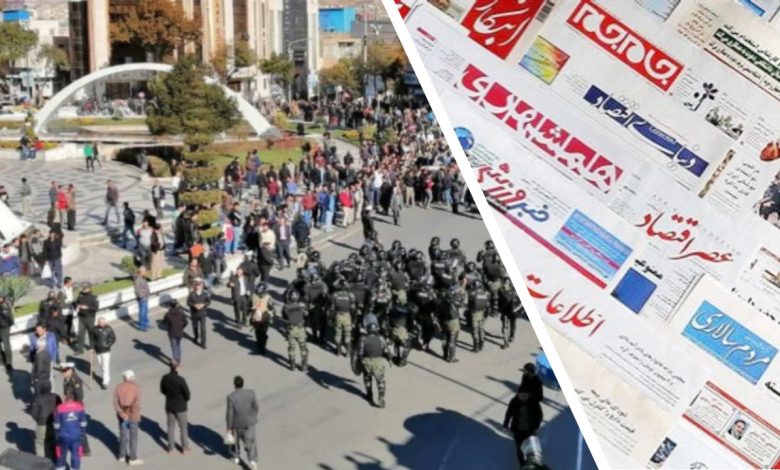Iran’s State Media Warn About Threats of “Super Challenges”

Written by
Shamsi Saadati
A year after the Iran protests of November which rattled the regime’s foundations, now state-run media express fear of another uprising.
Iran’s state media warn officials of another uprising
Rulers in Tehran are going through their worst period since usurping office in 1979. Iran’s economy is in shambles, public hatred toward the regime increases, and the mullahs are under international pressure. The country is now grappling with “super challenges,” as highlighted by state media.
“Unfortunately, we are facing food poverty,” wrote the state-run Mardom Salarie daily on December 7.
“Today, people’s incomes do not allow them to purchase enough food to survive. We should note that it is no longer a question of people being unable to buy houses, cars, or even quality food in this period. People can no longer afford the minimum amount of food,” Mardom Salarie adds.
According to this state-run media, “People have become poorer, and certain individuals have monopolized the country’s small amount of national production.”
“Inequality excludes people from society, and this would cause many psychological harms for the involved social classes, and it would have unpleasant results such as [public] anger and dissatisfaction,” wrote the state-run Sharq daily on December 7.
“Inequality stratifies society and creates deep gaps between social classes,” Sharq wrote, referring to the rising nepotism in Iran. Sharq acknowledges that “In systems where economic inequality is more than usual, neither freedom nor democracy will form.”
Iran Protests: Nationwide Uprising in Iran- November 2019
“In the past decade, society has suffered from severe double-digit inflation, sometimes close to 30 to 40 percent, and has suffered from severe poverty, especially deep class differences. This is very painful for society to tolerate,” Sharq acknowledges.
Finally, Sharq daily warns regime officials about the consequences of Iran’s economic and social problems.
“Officials should find a solution to decrease the social difference. Because the society cannot tolerate this deep inequality and its persistence would result in tons of problems,” it writes.
For decades, the Iranian regime and its state-run media tried to deceive Iranians by giving hollow promises or by playing a game of “moderation” and “reformism.” Outlets like Sharq were tasked to promote such a false notion among people.
During the first series of major Iran protests in 2018, Iranians chanted “reformist, hardliner, the game is over” and put an end to the myth of moderation of the vicious theocracy.
“January 2018 was the reformism’s apocalypse,” Sharq daily acknowledged on December 8. Sharq mentioned “violent, yet determined” force in society has ended decades of games of reformism.
Sharq then acknowledges that “From now on, the starting point of any democratic project is to eliminate the conditions that have ‘disgraced’ the ‘decent poor.’” Sharq daily continued that people’s protests for achieving their basic rights would immediately “goes on the path of seeking justice and demanding equality,” and “The desire for freedom is manifested in its best form.”
Iran Expanding protests hint at what is to come
In this regard, the state-run Mostaghel daily also mentioned, “If the needs of the people are not met, the volume of protests may increase. Consequently, the violence in the protests may increase.”
“On the one hand, people are in hardship and cannot make their ends meet. So they are forced to come to the streets to protest. Naturally, the system can tolerate these protests to some extent or control them, but the control of the protests may be lost to the relevant authorities,” Mostaghel wrote on December 8.

